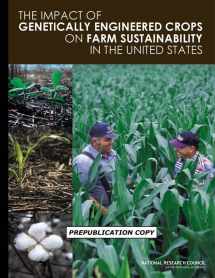
The Impact of Genetically Engineered Crops on Farm Sustainability in the United States
ISBN-13:
9780309147088
ISBN-10:
0309147085
Edition:
Illustrated
Author:
National Research Council, Division on Earth and Life Studies, Board on Agriculture and Natural Resources, Committee on the Impact of Biotechnology on Farm-Level Economics and Sustainability
Publication date:
2010
Publisher:
National Academies Press
Format:
Paperback
270 pages
FREE US shipping
Book details
ISBN-13:
9780309147088
ISBN-10:
0309147085
Edition:
Illustrated
Author:
National Research Council, Division on Earth and Life Studies, Board on Agriculture and Natural Resources, Committee on the Impact of Biotechnology on Farm-Level Economics and Sustainability
Publication date:
2010
Publisher:
National Academies Press
Format:
Paperback
270 pages
Summary
The Impact of Genetically Engineered Crops on Farm Sustainability in the United States (ISBN-13: 9780309147088 and ISBN-10: 0309147085), written by authors
National Research Council, Division on Earth and Life Studies, Board on Agriculture and Natural Resources, Committee on the Impact of Biotechnology on Farm-Level Economics and Sustainability, was published by National Academies Press in 2010.
With an overall rating of 4.2 stars, it's a notable title among other
books. You can easily purchase or rent The Impact of Genetically Engineered Crops on Farm Sustainability in the United States (Paperback) from BooksRun,
along with many other new and used
books
and textbooks.
And, if you're looking to sell your copy, our current buyback offer is $0.49.
Description
Since genetically engineered (GE) crops were introduced in 1996, their use in the United States has grown rapidly, accounting for 80-90 percent of soybean, corn, and cotton acreage in 2009. To date, crops with traits that provide resistance to some herbicides and to specific insect pests have benefited adopting farmers by reducing crop losses to insect damage, by increasing flexibility in time management, and by facilitating the use of more environmentally friendly pesticides and tillage practices. However, excessive reliance on a single technology combined with a lack of diverse farming practices could undermine the economic and environmental gains from these GE crops. Other challenges could hinder the application of the technology to a broader spectrum of crops and uses. Several reports from the National Research Council have addressed the effects of GE crops on the environment and on human health. However, The Impact of Genetically Engineered Crops on Farm Sustainability in the United States is the first comprehensive assessment of the environmental, economic, and social impacts of the GE-crop revolution on U.S. farms. It addresses how GE crops have affected U.S. farmers, both adopters and nonadopters of the technology, their incomes, agronomic practices, production decisions, environmental resources, and personal well-being. The book offers several new findings and four recommendations that could be useful to farmers, industry, science organizations, policy makers, and others in government agencies. Table of ContentsFront MatterSummary1 Introduction2 Environmental Impacts of Genetically Engineered Crops at the Farm Level3 Farm-Level Economic Impacts4 Farm-System Dynamics and Social Impacts of Genetic Engineering5 Key Findings, Remaining Challenges, and Future OpportunitiesAppendix A: Herbicide SelectionAppendix B: Tillage SystemsAppendix C: Biographical Sketches of Committee Members


We would LOVE it if you could help us and other readers by reviewing the book
Book review

Congratulations! We have received your book review.
{user}
{createdAt}
by {truncated_author}


